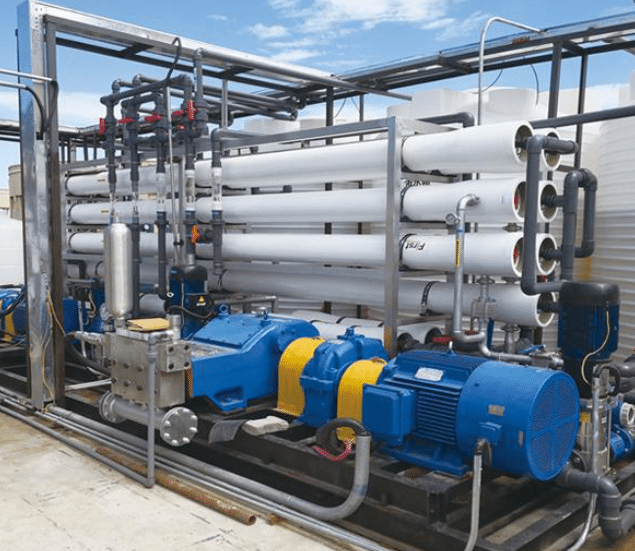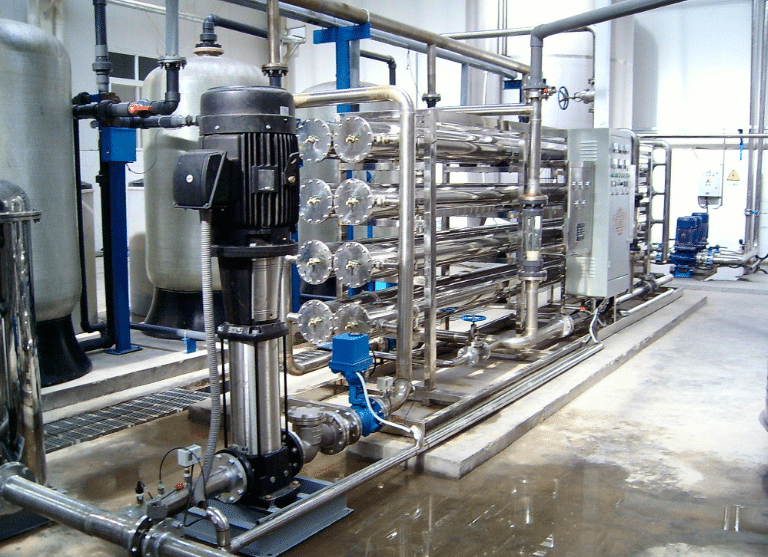Reverse osmosis (RO) technology has become one of the core technologies in modern water treatment and purification. Reverse osmosis (RO) technology is widely used in many fields due to its efficient water purification ability.
What is Reverse Osmosis?
Reverse osmosis (RO) is a technology used for water purification and filtration that removes dissolved substances, suspended matter, microorganisms, and contaminants from water through a semi-permeable membrane. It works by passing water through a semi-permeable membrane using a pressure higher than the natural osmotic pressure, allowing pure water molecules to pass through the membrane, while impurities and contaminants dissolved in the water are retained on one side of the membrane.
Application of Reverse Osmosis
Drinking Water Purification
The most familiar application of reverse osmosis technology is the purification of drinking water. In both domestic and municipal water systems, RO systems effectively remove salt, bacteria, viruses and other harmful substances from water. In this way, RO systems not only increase the purity of the water, but also improve the taste and safety of the water. This is essential to ensure public health and the provision of safe drinking water.
Desalination
In many areas lacking fresh water resources, desalination has become an important means of solving the problem of water shortage. Reverse osmosis technology filters seawater to remove salt and other dissolved substances, turning seawater into drinkable fresh water. This technology is widely used around the world, especially in the Middle East and arid island countries, RO system is an important tool to ensure the supply of water resources.
Industrial Water Treatment
Industrial production processes require large quantities of pure water, especially in the pharmaceutical, electronics, food and beverage industries. Reverse osmosis technology is able to provide high purity water to meet the stringent requirements of the production process. For example, in the pharmaceutical industry, RO water is used to produce drugs and injections to ensure product quality and safety; in the electronics industry, RO water is used to clean and cool equipment to prevent contaminants from affecting the production line.
Wastewater Treatment
With the advancement of industrialization, wastewater treatment has become an important task for environmental protection. Reverse osmosis (RO) technology is widely used in the field of wastewater treatment and reuse, by removing pollutants and harmful substances from wastewater, recovering resources and reducing the impact on the environment. For example, RO systems can treat industrial wastewater and municipal wastewater, making wastewater safe for reuse or discharge.
Food and Beverage Industry
In the food and beverage industry, reverse osmosis is used to concentrate fruit juices, produce purified water and improve product quality. RO systems remove impurities from water, ensuring the taste and safety of beverages. For example, many bottled water companies and soft drink manufacturers use reverse osmosis to produce consistent, high-quality products.

Aquariums and Marine Life
Reverse osmosis also plays an important role in maintaining optimal water quality for aquariums and marine habitats. ro systems remove harmful substances from the water, providing a stable environment that ensures the health and growth of marine life. This is vital for aquariums and marine sanctuaries.
Medical Applications
In the medical field, reverse osmosis technology is used to produce pure water for dialysis, sterilization and laboratory processes. ro systems ensure that water quality in medical processes meets high standards, preventing infections and guaranteeing therapeutic benefits.
Ultrapure Water Production
Ultrapure water is water that has been filtered and deionized through multi-stage filtration and deionization techniques to achieve extremely high purity. It is mainly used in the fields of electronics manufacturing, semiconductor production, pharmaceuticals, and high-precision laboratory research, etc. RO is one of the key steps in the production of ultrapure water, which provides a source of pre-treatment water for subsequent deionization by removing dissolved salts, particles, and organic substances from the water. Ultrapure water has extremely low conductivity and very few contaminants, ensuring the precise requirements of high-tech production and sensitive experiments.

Estimated share of reverse osmosis technology in various applications:
| Application Area | Percentage |
| Drinking Water Purification | 35% |
| Seawater Desalination | 20% |
| Industrial Water Treatment | 15% |
| Wastewater Treatment | 10% |
| Ultra-Pure Water Production | 5% |
| Food and Beverage Industry | 10% |
| Aquariums and Marine Life | 3% |
| Medical Applications | 1% |
| Agriculture | 1% |
Application of Reverse Osmosis in Water Quality Monitoring
Pretreatment and sample preparation
RO technology improves the accuracy of test results by removing suspended solids and large particulate impurities from water, providing clean samples for water quality monitoring.
Improved monitoring accuracy
By removing dissolved salts, organic matter and microorganisms from the water, RO technology ensures that only the target substances are detected by the monitoring equipment, minimizing interference and improving accuracy.
Reduced instrument maintenance
High purity water samples reduce deposits and fouling in monitoring equipment, reducing maintenance frequency and operational costs.
Real-time data analysis
Modern RO systems can be equipped with sensors and data acquisition devices that integrate with water quality monitoring systems to provide real-time water quality data to support immediate analysis and adjustment of the water treatment process.
Specific application cases
- Environmental monitoring: In environmental monitoring, RO technology treats natural water samples to analyze the concentration of pollutants in the water to provide data support for environmental protection.
- Water quality research: Research institutes use RO technology to treat water samples to ensure purity and provide reliable data for accurate analysis of trace contaminants in water.
Summary
Reverse osmosis (RO) technology is used in a wide range of applications. It ensures safe water quality in drinking water purification, provides potable fresh water in desalination, and optimizes water quality in industrial water treatment and wastewater treatment. RO technology is also used in the production of ultrapure water, water quality assurance for food and beverages, water treatment in aquariums and the medical field, optimization of water use in agriculture, and the treatment of water samples in environmental monitoring.
At Apure, we offer advanced water quality monitoring solutions, including multi-parameter water quality monitoring instruments, flow, level, pressure, and temperature measurement instruments. Whether you need efficient water quality analysis or accurate measurements, we have the technology to meet your needs. Contact us today to learn how you can optimize your water treatment system with innovative products from Apure.
